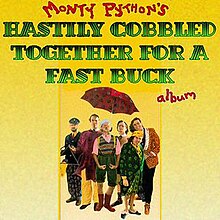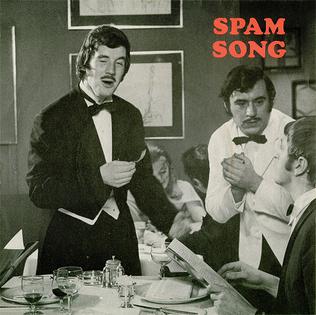
"Spam" is a Monty Python sketch, first televised in 1970 and written by Terry Jones and Michael Palin. In the sketch, two customers are lowered by wires into a greasy spoon café and try to order a breakfast from a menu that includes Spam in almost every dish, much to the consternation of one of the customers. As the waitress recites the Spam-filled menu, a group of Viking patrons drown out all conversations with a song, repeating "Spam, Spam, Spam, Spam… Lovely Spam! Wonderful Spam!".
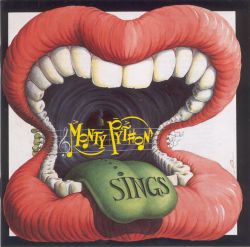
Monty Python Sings is a compilation album of songs by English comedy troupe Monty Python. Released in 1989 to celebrate their 20th anniversary, it contains popular songs from their previous albums and films. The album was dedicated to the memory of founding member Graham Chapman, who died two months before its release.

At Last the 1948 Show is a satirical television show made by David Frost's company, Paradine Productions, in association with Rediffusion London. Transmitted on Britain's ITV network in 1967, it brought Cambridge Footlights humour to a broader audience.

The Monty Python Matching Tie and Handkerchief is the fourth album by the comedy group Monty Python, released in 1973. Most of the material was newly written for the album along with a handful of sketches from the third series of Flying Circus, one from the second ("Bruces") and another from the first. The team were once again joined by Neil Innes, who provided a trio of rock music parodies for "The Background to History". The album was famously mixed and edited in a garden shed belonging to the father of producer Andre Jacquemin.
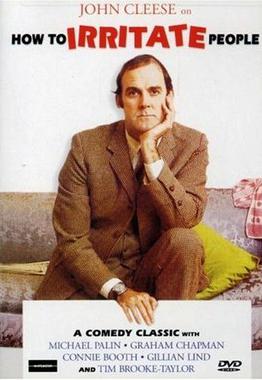
How to Irritate People is a US television broadcast filmed in the UK at LWT on 14 November 1968 and written by John Cleese, Graham Chapman, Marty Feldman and Tim Brooke-Taylor. Cleese, Chapman, and Brooke-Taylor also feature in it, along with future Monty Python collaborators Michael Palin and Connie Booth.

The Final Rip Off is a compilation double album by Monty Python, released in 1987. It was the team's first release on Virgin Records, after the label acquired the rights to their back catalogue previously released on Charisma. The set contains material from those six albums, but not from the Life of Brian or The Meaning of Life soundtracks, which were released on other labels. Michael Palin added some new linking material while all the songs were remixed by producer Andre Jacquemin including one, "Henry Kissinger", which featured a previously unreleased section. Contrastingly, the selections from Another Monty Python Record and Live at Drury Lane were mixed from stereo into mono. The cover art, with its graphic image of spilling guts, was illustrated by Les Edwards.

The Monty Python Instant Record Collection is the title of two compilation albums by the Monty Python troupe. The first was released in the UK and Canada in 1977 and drew from the group's first three studio albums, first live album, and first soundtrack album on the Charisma label, while the second was released in the US in 1981 and comprised tracks from their four albums released on the Arista label. Billed as "the pick of the best of some recently repeated Python hits again, Vol. II", the record sleeve was designed by Terry Gilliam. The UK/Canadian version originally featured packaging that folded out into a cardboard box resembling a large stack of record albums. An inner sleeve featured a spoof "Where Are They Now?" update on the members of the Python team.

The Ultimate Monty Python Rip Off is a compilation album released by Monty Python in 1994 on the occasion of their 25th anniversary. The album contains no previously unreleased material and was released as a sampler for the simultaneous release of The Instant Monty Python CD Collection box set.
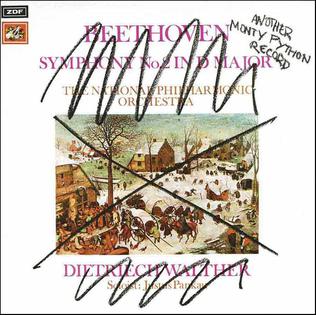
Another Monty Python Record is the second album produced by the Monty Python comedy group, released in 1971. Dissatisfied with their monaural BBC debut album released the previous year, the group took full control of the follow-up, which would be the first release of a six-album deal with Charisma Records in the UK. Most of the material is from the second BBC series of Monty Python's Flying Circus, with a few newly written pieces. One track, "Stake Your Claim", is an English-language version of a sketch from the team's first German episode.
"Election Night Special" is a Monty Python sketch parodying the coverage of United Kingdom general elections, specifically the 1970 general election, on the BBC by including hectic actions by the media and a range of ridiculous candidates.

Monty Python's Previous Record is the third album by Monty Python. Released in 1972, it marked the group's first collaborations with regular sound engineer Andre Jacquemin as well as musician Neil Innes, who had previously appeared with future members of the Python team on Do Not Adjust Your Set. The album contains many sketches from the third series of Flying Circus, one from the second as well as an abridged version of "The Tale of Happy Valley" from the second German show. The album was released midway through the broadcast of Series 3, whose sketches featured on the album were all from its first half, with the exception of "Dennis Moore" which aired a month later and therefore made its debut here. The oldest sketch on the album, Eric Idle's "Radio Quiz Game", dates back to I'm Sorry, I'll Read That Again where it was performed by Graeme Garden - Idle having subsequently performed the sketch himself on two editions of Do Not Adjust Your Set. The rest of the material was specially written for the album.

The Album of the Soundtrack of the Trailer of the Film of Monty Python and the Holy Grail is the first film soundtrack album by Monty Python, released in 1975. It features selected scenes from Monty Python and the Holy Grail interspersed with a large volume of new studio material, much of which centers on a spoof screening of the film at the Classic Silbury Hill Theatre. Also among the new items is the "Marilyn Monroe" sketch, which Graham Chapman co-wrote with Douglas Adams - the pair having recently collaborated on the fourth series of Monty Python.

Monty Python Live at City Center is a US-only live album by Monty Python, recorded at the New York City Center in April 1976 and rush released by Arista Records the following month. In order to get the album out in the shops quickly, the recordings were made early on in the run, where some of the performances were affected by faulty microphones. The team were joined onstage by regular actress Carol Cleveland and musician Neil Innes, who also performed in some sketches.

Monty Python's Life of Brian is the second soundtrack album by Monty Python, released in 1979 alongside the film of the same name. It contains scenes from the film interrupted by linking sections performed by Eric Idle and Graham Chapman, who also acted as producers following an aborted attempt at a soundtrack album by Michael Palin. The album opens with a brief rendition of "Hava Nagila" on Scottish bagpipes, which had earlier been considered for use in a scene later cut from the film.
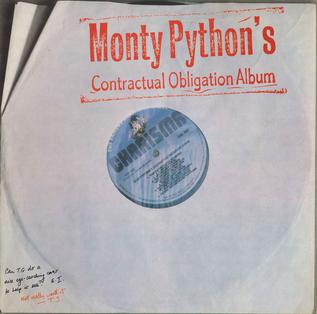
Monty Python's Contractual Obligation Album is the final studio album by Monty Python, released in 1980. As the title suggests, the album was put together to complete a contract with Charisma Records. Besides newly written songs and sketches, the sessions saw re-recordings of material that dated back to the 1960s pre-Python shows I'm Sorry, I'll Read That Again, The Frost Report, At Last The 1948 Show and How To Irritate People. One track, "Bells", dates from the sessions for Monty Python's Previous Record, while further material was adapted from Eric Idle's post-Python series Rutland Weekend Television. The group also reworked material written but discarded from early drafts of Life Of Brian, as well as the initial scripts for what would eventually become The Meaning Of Life.

Monty Python's The Meaning of Life is the third and final soundtrack album by Monty Python, released in 1983 alongside their last film. Billed as "The only soundtrack album to be introduced by live fish! ", it consists of sketches and songs from the film, with a few links performed by Michael Palin and a brief appearance from Terry Gilliam.

Python Night was an evening of Monty Python-related programmes broadcast on BBC2 on 9 October 1999, to celebrate the 30th anniversary of the first broadcast of Monty Python's Flying Circus. It featured newly written sketches, three documentaries and a screening of Monty Python's Life of Brian.

Not the Messiah (He's a Very Naughty Boy) is a comedic oratorio based on Monty Python's Life of Brian. It was written by former Monty Python cast member Eric Idle and collaborator John Du Prez, and commissioned by the Luminato festival.

The Fairly Incomplete & Rather Badly Illustrated Monty Python Song Book is a compendium of songs by Monty Python, released in 1994 on the occasion of their 25th anniversary. The book contains the lyrics and musical scores for songs from the group's Flying Circus TV series, albums and films. Also included are "The Ferret Song" and "Rhubarb Tart Song", which originate from I'm Sorry, I'll Read That Again before appearing on At Last The 1948 Show. The musical scores were edited by regular Python collaborator, John Du Prez.
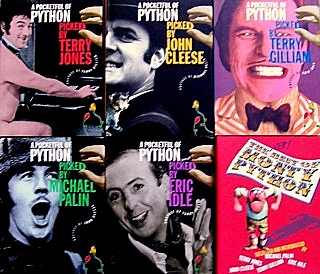
A Pocketful of Python is a series of five books by the Monty Python team, in which each of the surviving members selects their favourite material from the group’s TV series, films, records and books. The first two volumes, by Terry Jones and John Cleese, were released in 1999 as part of the team’s 30th anniversary celebrations. Two further volumes, by Terry Gilliam and Michael Palin, followed in 2000 while the final volume, by Eric Idle, was eventually released in 2002. Each team member’s volume includes a preface written by one of the other Pythons. In 2006 all five volumes were released as a single paperback edition, entitled The Very Best of Monty Python.
